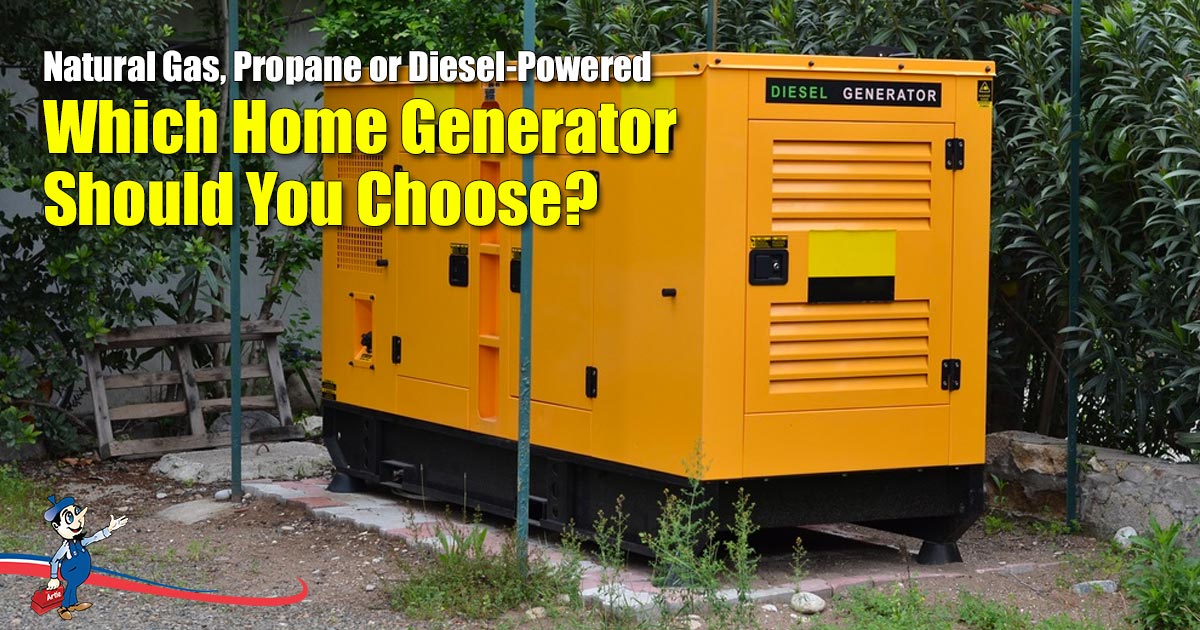Natural Gas, Propane or Diesel-Powered – Which Home Generator Should You Choose?

Deciding to add a generator to your home is a great step towards a prepared and comfortable future. With a variety of generators to choose from and many factors to consider, the choice of which to go with can be daunting.
This guide will familiarize you with the variables and options that come with finding the right home generator for you.
How Much Energy Do You Need?
Most home generators with a lower output produce enough to cover essential functions like some lighting fixtures, central air conditioning, refrigerator, freezer, and water heating.
Depending on the size of these necessities, you might find all your needs satisfied with a lower-output, 8 to 11-kilowatt generator. This will lower the price of the generator and the amount of fuel it consumes.
If what you’re looking for is a whole-home power experience (basics plus washing machine and dryer, stove, microwave oven, security system, garage door opener, full lighting, pool pump) you’ll need to invest in a more powerful, 40 and up, kilowatt generator.
Which Fuel Is Right For You?
Though the purpose is the same, some factors specific to your living situation and what kind of experience you want from your generator should guide whether you purchase a natural gas, propane, or diesel generator. Consider the following factors:
Natural Gas
If you’d enjoy a quiet generator, a lower pollutant emission level, an unlimited fuel source, and if you live in an area that has a natural gas infrastructure in place, then natural gas might be the direction to look towards. Aside from being widely available and having a near-infinite shelf life, natural gas also boasts a claim to “clean-burning,” meaning it produces no soot or ash, unlike gasoline or diesel engines.
Because of Florida’s lack of earthquakes, natural gas infrastructure is widely available in most areas. Check natural gas availability in your area before pursuing this option.
Some of its drawbacks are set-up costs if attaching it to the available infrastructure and lower power output relative to gas or diesel. Unlike propane or diesel, natural gas cannot be purchased at a gas station in a pinch if something happens to the line feeding it. The life expectancy of natural gas generators is generally lower than that of diesel.
Propane
Propane possesses many of the same benefits as natural gas: clean-burning, lower emissions, quiet running, and wide availability with the added benefit of being sold in many home-improvement stores and some convenience stores. It also has a near-unlimited shelf life.
Its drawbacks are also similar to natural gas. Generally higher installation costs, expensive fuel relative to diesel, and a shorter life expectancy and lower power output relative to diesel generators.
Diesel
In vehicles, diesel engines are known for having longer operational lives, and that carries over into their home-generator counterparts, with operational lives potentially reaching 15,000 hours with proper maintenance. They’re also the least expensive to operate and can work harder for greater amounts of time without problems arising. Diesel is also the most widely available fuel source between natural gas and propane.
Though diesel has some benefits over natural gas and propane, it has its share
of drawbacks. Fuel cannot be stored for longer than two years without
additives. Even though the fuel is widely available, it’s quickly bought out
and can even be unavailable due to power outages in disaster situations.
Diesel generators are significantly louder than their natural gas and propane counterparts and require a tight enclosure to suppress their operational noises. Their pollutants and emissions are greater than either natural gas or propane and are not a “clean burning” fuel. Unlike natural gas or propane, diesel generators should be run at or around 80% of their capacity to avoid a condition known as “wet stacking,” where unburned fuel finds its way into the exhaust system, becoming oily and congested unless burned off by increasing output.
Though the task of choosing and installing a whole-home generator is daunting, you are not alone. The experts at Art Plumbing, AC and Electric are ready to help!








